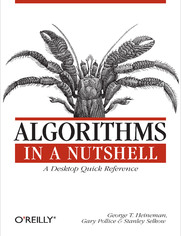Algorithms in a Nutshell - Helion

ISBN: 978-14-493-9113-3
stron: 364, Format: ebook
Data wydania: 2008-10-14
Ksi─Ögarnia: Helion
Cena ksi─ů┼╝ki: 159,00 z┼é
Creating robust software requires the use of efficient algorithms, but programmers seldom think about them until a problem occurs. Algorithms in a Nutshell describes a large number of existing algorithms for solving a variety of problems, and helps you select and implement the right algorithm for your needs -- with just enough math to let you understand and analyze algorithm performance.
With its focus on application, rather than theory, this book provides efficient code solutions in several programming languages that you can easily adapt to a specific project. Each major algorithm is presented in the style of a design pattern that includes information to help you understand why and when the algorithm is appropriate.
With this book, you will:
- Solve a particular coding problem or improve on the performance of an existing solution
- Quickly locate algorithms that relate to the problems you want to solve, and determine why a particular algorithm is the right one to use
- Get algorithmic solutions in C, C++, Java, and Ruby with implementation tips
- Learn the expected performance of an algorithm, and the conditions it needs to perform at its best
- Discover the impact that similar design decisions have on different algorithms
- Learn advanced data structures to improve the efficiency of algorithms
With Algorithms in a Nutshell, you'll learn how to improve the performance of key algorithms essential for the success of your software applications.
Osoby które kupowały "Algorithms in a Nutshell", wybierały także:
- Algorytmy kryptograficzne. Przewodnik po algorytmach w blockchain, kryptografii kwantowej, protoko 79,00 zł, (39,50 zł -50%)
- Informatyk samouk. Przewodnik po strukturach danych i algorytmach dla pocz 58,98 zł, (29,49 zł -50%)
- My 89,00 zł, (44,50 zł -50%)
- Nauka algorytm 58,98 zł, (29,49 zł -50%)
- 40 algorytmów, które powinien znać każdy programista. Nauka implementacji algorytmów w Pythonie 77,00 zł, (38,50 zł -50%)
Spis tre┼Ťci
Algorithms in a Nutshell eBook -- spis tre┼Ťci
- Algorithms in a Nutshell
- SPECIAL OFFER: Upgrade this ebook with OReilly
- A Note Regarding Supplemental Files
- Preface
- Principle: Use Real Code, Not Pseudocode
- Principle: Separate the Algorithm from the Problem Being Solved
- Principle: Introduce Just Enough Mathematics
- Principle: Support Mathematical Analysis Empirically
- Audience
- Contents of This Book
- Conventions Used in This Book
- Using Code Examples
- Comments and Questions
- Safari Books Online
- Acknowledgments
- References
- I. I
- 1. Algorithms Matter
- 1.1. Understand the Problem
- 1.2. Experiment if Necessary
- 1.3. Side Story
- 1.4. The Moral of the Story
- 1.5. References
- 2. The Mathematics of Algorithms
- 2.1. Size of a Problem Instance
- 2.2. Rate of Growth of Functions
- 2.3. Analysis in the Best, Average, and Worst Cases
- 2.4. Performance Families
- 2.5. Mix of Operations
- 2.6. Benchmark Operations
- 2.7. One Final Point
- 2.8. References
- 3. Patterns and Domains
- 3.1. Patterns: A Communication Language
- 3.2. Algorithm Pattern Format
- 3.3. Pseudocode Pattern Format
- 3.4. Design Format
- 3.5. Empirical Evaluation Format
- 3.6. Domains and Algorithms
- 3.7. Floating-Point Computations
- 3.8. Manual Memory Allocation
- 3.9. Choosing a Programming Language
- 3.10. References
- 1. Algorithms Matter
- II. II
- 4. Sorting Algorithms
- 4.1. Overview
- 4.2. Insertion Sort
- 4.3. Median Sort
- 4.4. Quicksort
- 4.5. Selection Sort
- 4.6. Heap Sort
- 4.7. Counting Sort
- 4.8. Bucket Sort
- 4.9. Criteria for Choosing a Sorting Algorithm
- 4.10. References
- 5. Searching
- 5.1. Overview
- 5.2. Sequential Search
- 5.3. Binary Search
- 5.4. Hash-based Search
- 5.5. Binary Tree Search
- 6. Graph Algorithms
- 6.1. Overview
- 6.2. Depth-First Search
- 6.3. Breadth-First Search
- 6.4. Single-Source Shortest Path
- 6.5. All Pairs Shortest Path
- 6.6. Minimum Spanning Tree Algorithms
- 6.7. References
- 7. Path Finding in AI
- 7.1. Overview
- 7.2. Depth-First Search
- 7.3. Breadth-First Search
- 7.4. A*Search
- 7.5. Comparison
- 7.6. Minimax
- 7.7. NegMax
- 7.8. AlphaBeta
- 7.9. References
- 8. Network Flow Algorithms
- 8.1. Overview
- 8.2. Maximum Flow
- 8.3. Bipartite Matching
- 8.4. Reflections on Augmenting Paths
- 8.5. Minimum Cost Flow
- 8.6. Transshipment
- 8.7. Transportation
- 8.8. Assignment
- 8.9. Linear Programming
- 8.10. References
- 9. Computational Geometry
- 9.1. Overview
- 9.2. Convex Hull Scan
- 9.3. LineSweep
- 9.4. Nearest Neighbor Queries
- 9.5. Range Queries
- 9.6. References
- 4. Sorting Algorithms
- III. III
- 10. When All Else Fails
- 10.1. Variations on a Theme
- 10.2. Approximation Algorithms
- 10.3. Offline Algorithms
- 10.4. Parallel Algorithms
- 10.5. Randomized Algorithms
- 10.6. Algorithms That Can Be Wrong, but with Diminishing Probability
- 10.7. References
- 11. Epilogue
- 11.1. Overview
- 11.2. Principle: Know Your Data
- 11.3. Principle: Decompose the Problem into Smaller Problems
- 11.4. Principle: Choose the Right Data Structure
- 11.5. Principle: Add Storage to Increase Performance
- 11.6. Principle: If No Solution Is Evident, Construct a Search
- 11.7. Principle: If No Solution Is Evident, Reduce Your Problem to Another Problem That Has a Solution
- 11.8. Principle: Writing Algorithms Is HardTesting Algorithms Is Harder
- 10. When All Else Fails
- IV. IV
- A. Benchmarking
- A.1. Statistical Foundation
- A.2. Hardware
- A.3. Reporting
- A.4. Precision
- A. Benchmarking
- About the Authors
- Index
- About the Authors
- Colophon
- SPECIAL OFFER: Upgrade this ebook with OReilly





